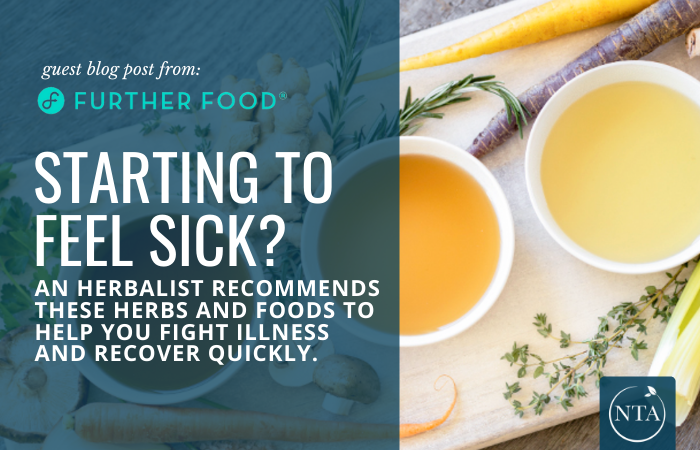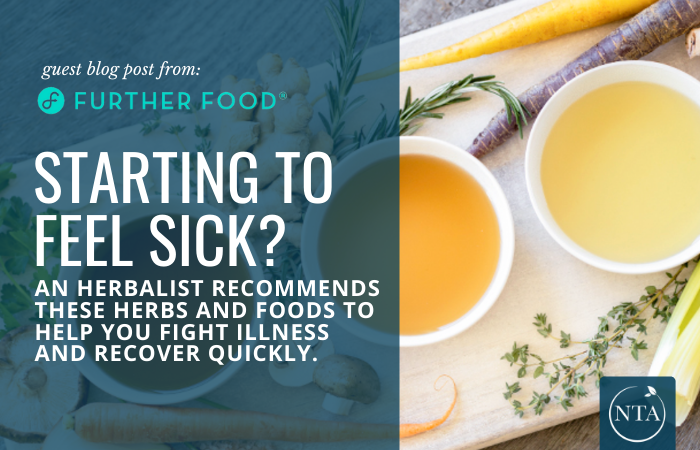
Starting to feel sick? Herbs and foods to help you fight illness and recover quickly
Blog
Starting to feel sick? Herbs and foods to help you fight illness and recover quickly

Sometimes, even after we take all the necessary precautions and maintain a healthy lifestyle, we still get sick. Whenever any of my patients (or family members) start to feel sick, there are certain foods and herbs that I recommend. Here are my recommendations of some herbs that you can start incorporating into your diet when you start to feel sick.
Garlic
Perhaps one of the tastiest foods, garlic packs quite a punch when it comes to fighting off pathogens. It’s one of the strongest herbal antimicrobials, even in in-vitro studies, and it’s especially effective in the respiratory system, where bacteria and viruses like to take hold. Garlic stimulates digestion and liver function, helping us assimilate the most nutrition possible from our food. It’s warming which acts as a circulatory stimulant, and warms the body making us inhospitable environments for pathogens to thrive in. Garlic also contains inulin, which feeds our probiotic flora and keeps it healthy and abundant.
Drink Bone Broth
Whether you make it yourself, or buy it from your favorite market, bone broth is a time tested tradition when it comes to supporting yourself during an illness. Not only is it anti-inflammatory and high in nutrients and minerals, collagen rich bone broth also supports healthy bones and joints, and can help ease some of the body aches and pains that we experience when we get sick. Supercharge your bone broth by adding some herbs like garlic, medicinal mushrooms, and seaweed. I recommend sipping on bone broth throughout the day as soon as you start feeling sick.
Echinacea
Another one of our revered immune herbs and something that you should start taking as soon as you start feeling sick, echinacea can be taken to stimulate the immune system and fight off infection. It also helps reduce symptoms like sore throat, cough, and fever. Many studies have suggested that the constituents in echinacea that boost immune function also help to relieve pain, reduce inflammation, and have antiviral actions.
Ginger
Ginger has powerful antibacterial and antiviral properties, and it can be consumed in abundance when you start feeling sick to support your body’s fight against pathogens. There are lots of delicious recipes you can add ginger to, or you can also make a delicious immune boosting tea.
Herbal Steams
Herbal steams can be a really fun and easy way to get medicine directly into your body to fight infection quickly. Since many bacteria and viruses like to live in the respiratory system, a steam is one of the best ways to deliver herbal medicine right to the source of the infection. Gather some aromatic, antibacterial and antiviral herbs like thyme or garlic, place them in a pot of hot water, create a little tent around your head and water and breathe the steam right into your lungs.
Adaptogens
Adaptogens help the body mediate stress levels, whether that stress comes from work, life or an illness. Adding some of these superfoods into your diet can do wonders for your stress levels while also helping you fight off infections. Schisandra, for instance, is a powerful adaptogenic herb that is a powerful antioxidant that helps to neutralize damage from free radicals, while lowering inflammation in the body. It has immune-regulatory actions, is liver supportive, and even calms the coughing reflex.
Eleuthero has been found to increase the activity of the B and T cells, and helps to increase the level of antibodies the body is able to produce. It’s active on the respiratory system, toning the organs of the respiratory tract and helping the body to expel excess mucous. As an adaptogen, eleuthero is nutritive to the adrenals, and helps the body rebuild its immune and energy stores.
Herbs That Help With Certain Symptoms
Especially as we get into cold and flu season, I make sure to stock up on certain herbs that are particularly helpful with coughs or fevers.
Herbs that help coughs
In addition to being immune supportive herbs that are helpful to take when you start feeling sick, both ginger and elecampane function as antispasmodics. This action is important when it comes to illnesses that have a cough as one of their symptoms. When we cough, our bodies are trying to expel pathogens within the mucus, but oftentimes, viruses can cause a racking and unproductive cough that causes pain and makes it difficult to breathe. However, since coughs do have a function, rather than trying to suppress coughs, I recommend choosing herbs to help support the function, while easing the discomfort that the symptom causes.
Ginger helps to ease the urge to cough, while simultaneously acting as a pain reliever. It can help ease spastic coughs in the lungs, and soften the pain and tenderness that comes from an illness, whether it be in the respiratory system, the head, or the muscles.
In addition, another herb to consider when you have a cough is elecampane. This bitter herb is phenomenal at managing a cough, and respiratory symptoms in general. It’s a warming plant that has excellent expectorant actions, which is key for those coughs that are constant, but not strong enough to bring up any mucus. Elecampane helps to break up anything in the lungs making it easier to expel, while also making the coughs more productive.
Treatment for fevers
Whenever you start to feel sick and a fever is present, make sure to stay hydrated. Drinking lots of liquids like water and broth are key, and if you’re feeling like you can’t keep up with liquids, a short, tepid bath can be helpful for rehydrating the body quickly.
Elderberry is a delicious syrup that I recommend you start taking as soon as you start to feel sick (and you can even take elderberry daily to help keep your immune system strong and able to fight off illness). Additionally, elderberry has been shown to shorten the duration of symptoms like fever, and can be taken as often as one desires. It is a diaphoretic herb, which means that it helps to relax the muscles to release tension, and opens up the pores to release heat, both actions that are essential to managing a fever.
References
Hopkinsmedicine.org
Barak V, Halperin T, Kalickman I. The effect of Sambucol, a black elderberry-based, natural product, on the production of human cytokines: I. Inflammatory cytokines. European Cytokine Network. 2001; 12(2):290-6.
Zakay-Rones Z, Varsano N, Zlotnik M, et al. Inhibition of several strains of influenza virus in vitro and reduction of symptoms by an elderberry extract (Sambucus nigra L.) during an outbreak of influenza B Panama. Journal of Alternative and Complementary Medicine. 1995; 1(4):361-9.
By Clair Moore
Health Expert at Further Foods
The views and opinions expressed in this post are those of the author and do not necessarily reflect the views and opinions of the NTA. They are intended for general information purposes, and are not to be considered a substitute for medical advice, diagnosis, or treatment.
Join us for a Live Webinar with one of our Instructors and Admissions Advisors!
During this call, you’ll explore and learn:
- How to create a rewarding career in holistic nutrition that will give you the confidence and competence to replace your full-time income (whether you’re new to nutrition or or using it to enhance your current services)
- How our unmatched education and instructor support sets our NTP program apart from other nutrition programs
- How graduates are successfully using their education and the many career opportunities available to you
- If the NTP program is the right fit for you and how to move forward in financing your education



